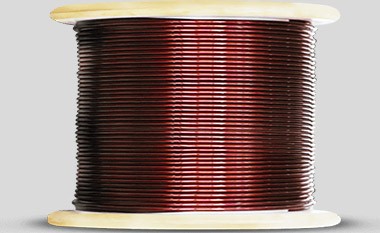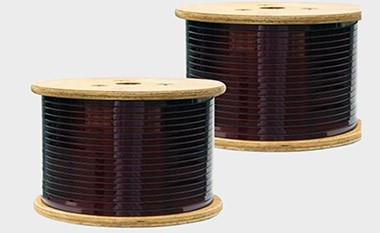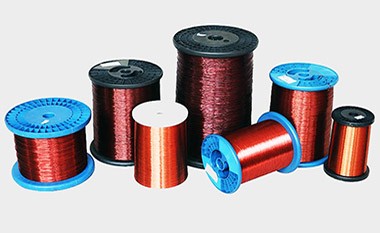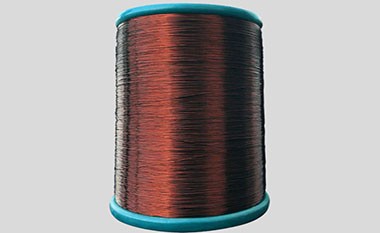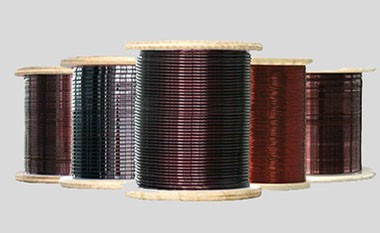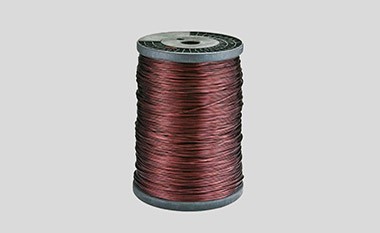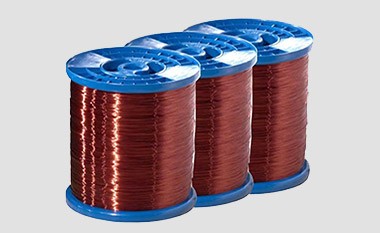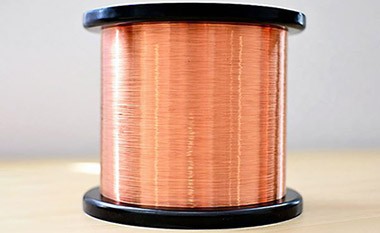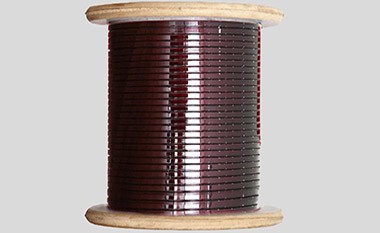These are insulated copper or aluminum wires coated with a thin layer of enamel. They are commonly used in electrical motors, transformers, and inductors due to their excellent conductivity and lightweight properties.
aluminum enameled wires Supplied Forms
-
Enameled Round Aluminum Wire
The core material of enamelled round aluminum wire is aluminum, which has good conductivity and lightweight properties. Compared to copper wire, aluminum wire has a lower density and is more cost-effective, making it a substitute for copper wire in many applications.
-
Enameled Rectangular (Flat) Aluminum Wire
Enameled rectangular aluminum wire typically uses high-purity aluminum alloys to ensure its electrical conductivity and mechanical properties. Common aluminum alloys include 1060 and 1350.
-
Enameled Copper Clad Aluminum Wire(ECCA)
Enameled Copper Clad Aluminum Wire (ECCA) is produced from copper-clad aluminum (CCA) wire with an insulating enamel coating.
-
Class 130 Enameled Aluminum Wire
Class 130 enameled aluminum wire is suitable for applications requiring moderate temperature resistance, with a temperature rating of up to 130°C. It is typically used in motors and transformers with lower heat requirements.
-
Class 155 Enameled Aluminum Wire
Class 155 enameled aluminum wire is designed for applications that require higher temperature tolerances. It is commonly used in high-performance electrical devices, such as electric motors, generators, and transformers.
-
Class 180 Enameled Aluminum Wire
Class 180 Enameled Aluminum Wire is made from pure aluminum and insulated with polyimide. This enameled wire is used in transformers, motors, electrical equipment, and more.
-
Class 200 Polyimide Enameled Aluminum Wire
The Class 200 polyimide enameled aluminum wire is designed for a maximum operating temperature of 200°C. It features a polyimide insulation layer, which provides excellent thermal stability, chemical resistance, and electrical insulation properties.
-
Class 220 Polyimide Enameled Aluminum Wire
Grade 220 polyimide enameled wire is a high-performance wire with a rated operating temperature of up to 220°C. Compared with grade 200 wire, it has stronger heat resistance and stability and can withstand higher thermal stress.
-
Class 240 Polyimide Enameled Aluminum Wire
Class 240 Polyimide Enameled Aluminum Wire has a heat resistance of up to 240°C and also possesses good resistance to varnish, casting resins, solvents, and thermal shock.
what is enameled aluminum wire
Enamelled aluminum wire is an aluminum conductor that is coated with a layer of enamel insulation. This enamel coating not only provides crucial insulation protection to prevent leakage but also ensures the stability and reliability of the wire.
Enamelled aluminum wire and its derivatives are widely used in electric motors, transformers, windings, and other electrical equipment. Its lightweight characteristics and excellent conductivity make it an ideal choice for applications that require high performance and lightweight design.
Classification of enameled aluminum wire
Enameled Flat Aluminum Wire
This type of wire features a flat, rectangular cross-section, with an enamel insulation coating applied to its surface. The flat design increases the surface area in contact with the winding or the components it is used with, which helps to improve heat dissipation and allows for higher packing densities in coils or electrical components.
Enameled flat aluminum wire is commonly used in the manufacturing of electric motors, transformers, and inductors, especially where space constraints or specific geometric shapes are required.
Enameled Round Aluminum Wire
This is the most traditional form of enameled aluminum wire, with a circular cross-section. The wire is coated with an insulating enamel layer, which provides electrical insulation while maintaining good conductivity. It is flexible and easy to wind, making it ideal for many electrical applications.
Round enameled aluminum wire is used in various industries for winding coils, motors, transformers, inductors, and solenoids, offering a lightweight and cost-effective alternative to copper wire in electrical windings.
Glassfiber Insulated Aluminum Wire
This wire is coated with a layer of glass fiber insulation, which provides higher thermal resistance compared to conventional enamel coatings. The glassfiber insulation offers excellent protection against high temperatures and harsh operating environments.
Glassfiber insulated aluminum wire is commonly used in applications that require superior temperature resistance, such as in high-performance motors, transformers, or in the aerospace industry where high durability under extreme conditions is crucial.
Enameled aluminum Wire Size (AWG)
| Product | AWG Size | Diameter (mm) | Diameter (inches) | Common Uses |
| 14 awg aluminum enameled wires | 14 AWG | 1.63 | 0.064 | Suitable for motors, transformers, and other electrical devices requiring significant current capacity. The enamel insulation protects against environmental factors. |
| 16 awg aluminum enameled wiress | 16 AWG | 1.29 | 0.051 | Used in smaller motors, coils, and winding applications, balancing flexibility and current capacity. |
| 18 awg aluminum enameled wires | 18 AWG | 1.02 | 0.040 | Ideal for winding smaller coils, transformers, and low-power motors, providing good insulation and moderate current capacity. |
| 24 awg aluminum enameled wires | 24 AWG | 0.51 | 0.020 | Used for fine winding in transformers, inductors, and small motors, suitable for high precision and lower current capacity. |
| 28 awg aluminum enameled wires | 28 AWG | 0.32 | 0.0126 | Commonly used in low-power applications, signal wiring, small coils, and delicate electronic components. |
| 32 awg aluminum enameled wires | 32 AWG | 0.20 | 0.008 | Typically used in very fine applications, such as winding miniature coils and sensors, where minimal weight and space are required. |
| 42 awg aluminum enameled wires | 42 AWG | 0.08 | 0.0031 | Used in specialized applications requiring extremely fine wire, like high-frequency transformers and micro-coils. |
| 43 awg aluminum enameled wires | 43 AWG | 0.07 | 0.0026 | One of the thinnest wires available, used in ultra-fine applications such as miniature inductors and high-frequency circuits. |
Enameled aluminum Wire Insulation types
| Insulation Type | Description |
| Polyester Overcoated with Polyamideimide Magnet Wire | Features dual insulation, with a polyester base coat and a polyamideimide outer layer. Provides excellent dielectric strength and thermal stability, making it suitable for high-temperature applications such as motors, transformers, and other high-performance electromagnetic uses. |
| Aromatic Polyimide Resins Magnet Wire | Insulated with aromatic polyimide resin, offering excellent thermal stability and chemical resistance. Can withstand high temperatures (up to 240°C or higher), suitable for aerospace, military equipment, and other high-temperature environments requiring long-term stable operation. |
| Polyimide Magnet Wire | Insulated with polyimide, providing outstanding thermal stability, chemical resistance, and electrical performance. Suitable for high-temperature applications, it can withstand temperatures above 250°C, widely used in high-performance motors, transformers, high-power coils, and other fields. |
| Polyester Insulated Magnet Wire | Insulated with polyester, offering good electrical properties and moderate thermal stability (typically up to 130°C). Suitable for small motors, sensors, transformers, and other electrical devices, ideal for applications with moderate temperature requirements. |
| Polyvinyl Acetal Insulated Magnet Wire | Insulated with polyvinyl acetal resin, featuring good mechanical properties, smooth surface, and electrical insulation. Suitable for applications with lower temperature requirements (Class 105, maximum temperature resistance of 105°C), ideal for motors, transformers, and other fields. |
Polyester Overcoated with Polyamideimide Magnet Wire
This wire is insulated with a dual-layer coating: a polyester base layer overcoated with polyamideimide. The polyester layer provides excellent dielectric strength and heat resistance, while the polyamideimide layer adds enhanced thermal stability and mechanical strength. This type of wire is commonly used in motors, transformers, and other high-performance electromagnetic applications requiring high heat resistance and durability.
Aromatic Polyimide Resins Magnet Wire
This type of magnet wire is insulated with aromatic polyimide resin, a high-performance polymer known for its superior thermal stability and resistance to chemical degradation. It can operate at very high temperatures (often up to 240°C or higher) and is commonly used in high-temperature applications such as aerospace, military equipment, and electrical devices that require long-term stability at elevated temperatures.
Polyimide Magnet Wire
Polyimide-insulated magnet wire is known for its excellent thermal stability, chemical resistance, and electrical properties. Polyimide coatings can withstand temperatures up to 250°C or more, making it ideal for high-performance applications in environments where high heat, electrical stress, and environmental resistance are critical, such as in electric motors, transformers, and high-power coils.
Polyester Insulated Magnet Wire
Polyester insulation provides a smooth, reliable coating with good electrical properties and moderate thermal stability (typically up to 130°C). This wire is often used in less demanding applications than polyimide or polyamideimide-coated wires, such as in small motors, inductors, and transformers, where moderate heat resistance and high insulation strength are sufficient.
Polyvinyl Acetal Insulated Magnet Wire
Polyvinyl acetal is a resin-based insulation material known for its excellent mechanical properties, smooth surface, and good electrical insulation. This wire is typically used in applications requiring moderate temperature resistance (Class 105, up to 105°C) and is often found in motors, transformers, and appliances where the wire must endure some mechanical stress or wear. Polyvinyl acetal offers good resistance to abrasion and is easy to process.
Hot Selling Products of HC Enamelled Aluminum Wire
Class 220 Polyester (Amide)(Imide) Overcoated with Polyamideimide, Film-Insulated Rectangular Aluminum Wire
This wire is designed for high-temperature applications and features a dual insulation system. It is first coated with a polyester (amide/imide) layer, then overcoated with polyamideimide film. The rectangular aluminum wire is commonly used in motors and transformers where heat resistance and insulation strength are required.
Class 220 Polyester Overcoated with Polyamideimide Film-Insulated Round Aluminum Magnet Wire for Hermetic Applications
This round aluminum wire is specifically designed for hermetic applications, like sealed units, which require high reliability in harsh environments. It is insulated with a layer of polyester and a top coating of polyamideimide, offering high temperature resistance (Class 220).
Class 220 Polyester (Amide)(Imide) Overcoated with Polyamideimide Film-Insulated Round Aluminum Wire
Similar to the rectangular version, this round aluminum wire also has a dual insulation system (polyester and polyamideimide) to provide superior heat resistance and electrical insulation. It is suitable for various electrical and magnetic applications.
Class 130 Polyurethane Coated Polyamide Round Aluminum Magnet Wire
This round aluminum wire is insulated with a combination of polyurethane and polyamide coatings, which makes it resistant to high temperatures (Class 130) and suitable for use in motors, transformers, and inductors.
Class 105 Polyvinyl Acetal Film-Insulated Square Aluminum Magnet Wire
The square aluminum wire is insulated with polyvinyl acetal film, which provides good electrical insulation and mechanical protection. It is rated for Class 105 (105°C) and typically used in low-temperature applications, such as in appliances or small motors.
Class 155 Polyester Coated Polyamide Film Insulated Round Aluminum Magnet Wire
This round wire features a polyester and polyamide film insulation system, providing excellent thermal stability (Class 155). It is often used in motors, windings, and other applications where durability at higher temperatures is critical.
Class 105 Polyvinyl Acetal Film-Insulated Round Aluminum Magnet Wire
This round aluminum magnet wire is insulated with polyvinyl acetal, a material that offers good mechanical and electrical properties. It is rated for Class 105 (105°C) and is often used in applications requiring lower temperature tolerance.
Class 105 Polyvinyl Acetal Film-Insulated Rectangular Aluminum Magnet Wire
A rectangular version of the previous wire, insulated with polyvinyl acetal film. It is suitable for applications in electric machines and transformers requiring moderate temperature resistance (Class 105).
Class 105 Paper-Covered Bare Square Aluminum Wire
This is an aluminum wire with a paper-based insulation covering. Rated for Class 105, this type of wire is often used in applications where cost-effective insulation is required but still needs to meet certain temperature and performance specifications.
Class 105 Paper-Covered Bare Rectangular Aluminum Wire
Similar to the square wire but in a rectangular form. This wire is insulated with paper, and like the square version, it is used in electrical applications needing moderate temperature resistance (Class 105), such as transformers and motors.
What is the use of enamelled Aluminium wire?
Enamelled aluminum wire is applied across various industries due to its unique properties and advantages. It is a versatile material used in industries that require key factors such as electrical conductivity, thermal stability, and lightweight characteristics.
1. Electrical and Electronics Industry
Enamelled aluminum wire is widely used in equipment such as motors, transformers, generators, coils, solenoids, and inductors. Its excellent conductivity, lightweight, and good thermal stability make it an ideal choice for various electrical winding applications.
2. Automotive Industry
In the automotive sector, enamelled aluminum wire is used in components like ignition coils, alternators, and electric motors. Its lightweight properties help reduce vehicle weight, thus improving fuel efficiency, while its excellent electrical performance ensures reliability in high-performance electrical systems.
3. Aerospace
Due to its lightweight and high-temperature resistance, enamelled aluminum wire is widely used in aerospace applications. Particularly in aircraft systems, such as actuators, sensors, and other electrical components, enamelled aluminum wire effectively meets the demands for high performance, light weight, and heat resistance.
4. Home Appliances
Enamelled aluminum wire is also widely used in home appliances, such as washing machines, refrigerators, air conditioners, and fans, for motor windings. Its excellent conductivity and thermal stability make it a reliable choice for motor windings in these appliances, ensuring stable operation.
5. Renewable Energy
As demand for renewable energy increases, enamelled aluminum wire has also been applied in wind turbines, solar panels, and other renewable energy systems. Its lightweight properties help reduce the overall system weight, while its excellent conductivity ensures efficient energy transmission and distribution.
Storing Enamelled Aluminum Wire
To ensure the quality and prolong the lifespan of enamelled aluminum wire, proper storage methods are crucial. Below are the best practices for storing enamelled aluminum wire:
| Storage Points | Description |
| Maintain a Dry Environment | Enamelled aluminum wire is sensitive to moisture. High humidity can lead to corrosion of the wire and damage to the insulation layer. It should be stored in a dry, low-humidity environment. |
| Temperature Control | Store in a temperature-stable, cool environment, avoiding extreme temperatures or temperature fluctuations to prevent cracking or degradation of the enamel coating. |
| Avoid Direct Sunlight | Avoid exposing the wire to direct sunlight or ultraviolet radiation to prevent damage to the insulation coating. It should be stored in a shaded area. |
| Proper Winding and Tension | Ensure the wire on the spool is wound with even tension. Avoid excessive or insufficient tension, as it may lead to wire bending, tangling, or coating damage. |
| Clean Environment | The storage environment should be clean and dust-free to prevent dirt or dust particles from contaminating the insulation layer, which could affect electrical conductivity. |
| Avoid Mechanical Damage | Keep the wire away from sharp objects or heavy items to prevent scratches or damage to the insulation coating. Handle with care during transportation. |
| Store Spools Vertically | Spools should be stored vertically to prevent the wire from shifting or tangling, maintaining storage order and wire integrity. |
| Sealed Protection | If possible, store spools in sealed plastic bags or containers to further prevent moisture and contamination. |

